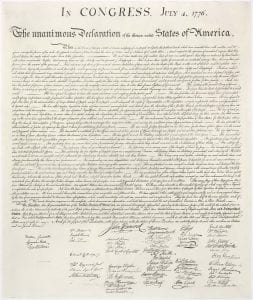 The opening words of the Declaration of Independence are among the most powerful words ever written. They speak to the fact that certain truths are fundamental to the basic understandings that both individuals and societies have about themselves. We are learning truth from the moment we are born-some theorize even before that. The nature of the truths we embrace and believe is shaped by those influences, both people and circumstances, that make up the world around us.
The opening words of the Declaration of Independence are among the most powerful words ever written. They speak to the fact that certain truths are fundamental to the basic understandings that both individuals and societies have about themselves. We are learning truth from the moment we are born-some theorize even before that. The nature of the truths we embrace and believe is shaped by those influences, both people and circumstances, that make up the world around us.
As we mature, and as our experience of the world around us expands, the truths we embrace can grow, develop and sometimes even change as we do. Truth can be spoken of as a basic component of who we are. I can be deprived of many things and adjust and survive, but removing or changing truths changes who I am as an individual.
That is why the authors of the Declaration of Independence began by naming and asserting basic truths that are at the core of the historic statement they were making. They did not say their list of truths are the complete list of truths that exist. By listing them as rights and as self evident, they declared these truths as unable to be removed. By naming the source of these rights and stating that they are for everyone, they declared them as absolute truths.
Do you believe there are absolute truths? What would one be? Where and from whom did you first learn it? How far would you go to defend that truth? Do most other people seem to accept this as a truth? How does the response of others make you feel?
 If you were writing the Declaration of Independence and had finished the beginning of the phrase, “We hold these truths….”, what would your list include? Can you list any other truths that you think others would agree with you are basic and essential enough to have a revolution over? Do you think most people agree with the three in this original document?
If you were writing the Declaration of Independence and had finished the beginning of the phrase, “We hold these truths….”, what would your list include? Can you list any other truths that you think others would agree with you are basic and essential enough to have a revolution over? Do you think most people agree with the three in this original document?
The truths we believe are at the core of who we are and what we do. To be in meaningful relationships we must agree on what are truths. Are you in any relationships where there is basic disagreement on what is truth? How difficult is it for you to keep your part of that relationship going? How much energy do you expend just keeping things civil?
Now, think of relationships where there is basic agreement on what truth is. How much more can be accomplished in these relationships? How much more enjoyable and satisfying is it to be in this kind of relationship?
 We will not always agree with everyone in our lives about what truth us. We live in a time when that seems elusive for many people. The most we can hope for in cases of disagreement is honest discussion of our differences, based on mutual respect and a shared desire for understanding.
We will not always agree with everyone in our lives about what truth us. We live in a time when that seems elusive for many people. The most we can hope for in cases of disagreement is honest discussion of our differences, based on mutual respect and a shared desire for understanding.
As we move forward, knowing what we believe and hold as truth and a desire to recognize that same desire in others can help us concentrate on our strengths and allow us to achieve the same goals as those who wrote, “We hold these truths….”
If you would like to receive new As We Move Forward posts, please subscribe to the As We Move Forward mailing list by clicking here. I release entries on a bi-weekly basis.We have a podcast containing the As We Move Forward articles read by Jae Bloom.
